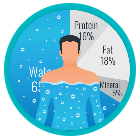
Water calculator

Water makes up more than 60% of your body mass and is an essential component for building and keeping all cells and tissues working properly. Maintaining the balance of water amounts in the body is important for the functioning of the various organs of the body and the continuation of vital functions. The body maintains a healthy state of fluids by achieving a balance between the amount of water entering the body and the amount of water lost by the body. The body loses on a daily basis about 2.5 liters of water, the bulk of which is excreted through the urinary system, while the rest is excreted through the digestive system and sweating. To maintain this balance, the body must get an amount equal to the amount it loses, so it is important to drink enough water every day.
How much water should I drink every day?
There is no set amount of water that you should drink on a daily basis, but the amount of water need varies from one person to another depending on a number of factors, these factors mainly include:
- Gender: Men need more water than women, because men have more muscle mass than women.
- Daily effort: The need for water increases when the amount of daily physical exertion increases, in order to compensate for fluid loss through sweating during the effort, in addition to providing sufficient water to maintain muscle activity and prevent muscle fatigue.
- Environmental conditions: You need more water in hot or humid climates
- General health status: The body loses a greater amount of fluid when suffering from fever, diarrhea or vomiting, so care must be taken to drink sufficient quantities of water to replace the lost water in the body. Urinary tract infections and kidney stones also cause increased water loss and an increased need for water.
- Pregnancy and breastfeeding: A woman who is pregnant or breastfeeding may need more fluids to maintain the balance of body fluids.
In general, the amount of water an adult needs per day is:
- 5 liters of water for men
- 5 liters of water for women
Benefits of drinking enough water
Water contributes to all vital processes in the body, including the production and consumption of energy, muscle contraction, digestion, excretion, respiration, circulation, heart function, and other functions. Drinking water frequently has a number of benefits, including:
- Maintaining joint flexibility and mobility
- Secretion of saliva and mucous substances that are important to protect the body's organs and perform the functions of digestion well
- Moisturizing and warming the inhaled air during breathing to maintain the integrity of the respiratory tracts and lungs
- It helps to increase the delivery of oxygen and micronutrients to the organs and tissues of the body, in addition to facilitating the functioning of cells, the production, and consumption of energy, the reduction of muscles, and the prevention of muscle fatigue and muscle fatigue.
- Increasing the moisture and elasticity of the skin and maintaining its vitality and luster, in addition to improving hair health and preventing hair loss
- Helps protect the brain and spinal cord and enhances nerve functions such as neurotransmission and focus
- Water is an important element in regulating body temperature and maintaining it within the normal level through sweating in hot weather, and the lack of body water leads to an increase in body temperature.
- Water is essential for the proper functioning of the digestive system, as water helps in promoting intestinal motility and improving digestion and absorption.
- Water regulates blood pressure by reducing blood viscosity and increasing its flow, and lack of water leads to increased blood viscosity and high blood pressure
- Water contributes to obtaining minerals and nutrients because these nutrients are soluble in water so they are easier to get into cells.
- Water is the most important component for regulating kidney function and excretion, and lack of water leads to the formation of kidney stones and renal insufficiency.
- Drinking water greatly improves performance during exercise. During exercise, muscles work by consuming sugars to produce energy, and this process produces waste products containing lactate and lactic acid, which cause muscle fatigue and fatigue. Water contributes to the removal of waste products from muscle cells and increases the entry of sugars into them, thus reducing muscle fatigue and fatigue.
- Drinking water helps in losing weight and preventing obesity because drinking water reduces the intake of sweets and helps prevent overeating.
Do drinking too much water cause harm?
It is very rare for you to get damaged by drinking too much water. When you drink more water than the body needs, the fluid regulating mechanisms in the body increase the excretion of water by the kidneys. Drinking too much water may only be a problem in people with advanced kidney failure or severe heart failure because the body can't get rid of excess fluid.
Treatment Services
In the Best Medical Centers
Contact Us
Please fill the form below and describe your condition, We will contact you back
- Dental Treatment
- Hair Transplant
- Obesity Surgery
- Vision Correction
- Health Resorts
- Other Medical Services
- No elements found. Consider changing the search query.
- List is empty.
Your personal data is processed as indicated in the general statement text and by continuing, you explicitly consent to the processing

